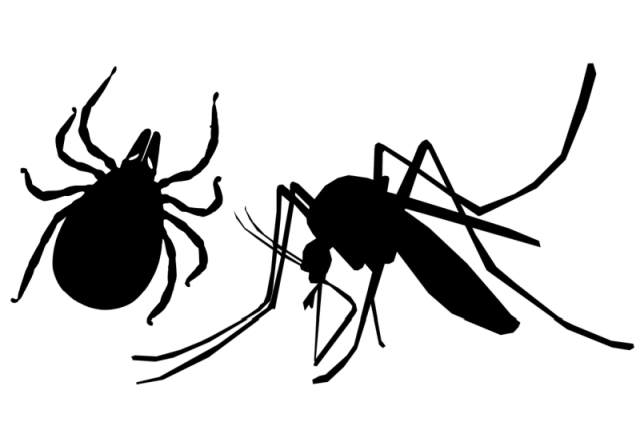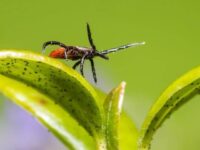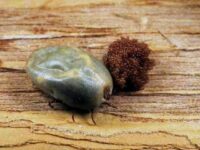This post contains affiliate links. If you click on a link and make a purchase I earn a commission at no extra cost for you.
The chemicals Picaridin and Deet are among the most widely used bug repellents. They effectively repel ticks, mosquitoes, and many other parasites. In a direct comparison Picaridin vs Deet, DEET seems to protect a little better and longer.
The less you are bitten by ticks and mosquitoes, the lower the risk of becoming infected with tick-borne or mosquito-borne diseases. Effective protection against ticks and mosquito bites is best achieved with a combination of effective insect repellents combined with protective clothing.
Picaridin vs Deet
In Insect repellents, one or a mixture of chemical substances are used to achieve an insect-repelling effect that is strong enough to reliably ward off parasites. Two of the most effective substances that repel insects are Picaridin and DEET. They repel mosquitoes, ticks, and most other bloodsucking parasites and are used in different concentrations in many bug repellents.
Both substances are reliable and have been used for many years. However, as with anything that has an effect that is desired, there can sometimes also be undesired side effects that may even be harmful to your health. Read here on about the pros and cons of Picaridin vs DEET.
How Repellents keep ticks and mosquitoes of
Whether you use Picaridin vs DEET, both products work by forming a “protective shield” over the skin area of which they have been applied. Bloodsucking pests such as ticks, mosquitoes, black flies, horse flies can no longer smell you.
Most bloodsucking insects are attracted to their prey by the Carbon dioxide in the exhaled air, by smelly acids when sweat breaks down and at a short distance, they sense body heat. Effective repellents confuse the animals’ sensory organs so they no longer recognize and find their potential bite victim.
The protective effect against ticks lasts about four to five hours, depending on the concentration of the active ingredients, against mosquitos protection can last for as long as 8 to 10 hours. However, those are just estimates as there are many other factors that determine how long the protection lasts. Besides the concentration of the active ingredient, the actual amount applied, the type of insect, environmental factors such as temperature and humidity, and how much one sweats plays a role too.
What is Picaridin
- Non-greasy, fragrance free, odorless; dries quickly and won't damage plastics or synthetic coatings — safe for use on clothing, backpacks, watches, sunglasses, fishing line, firearm finishes, and more
- Safe for use on the whole family, long-lasting insect and tick repellent sprau deters a wide variety of pests — up to 12 hours against mosquitoes and ticks and up to 8 hours against flies, gnats, and chiggers
- Fragrance-free topical insect repellent with 20% Picaridin — more effective at repelling biting flies than DEET; repels disease-spreading ticks (Lyme, tick-borne encephalitis) and mosquitoes (West Nile, Dengue, and Zika viruses), chiggers, and more
- Very comfortable to wear on your skin, it's ideal for all your outdoor adventures, from camping, backpacking, hunting, and fishing to backyard BBQs, sporting events, days at the park, and more
- Top rated bug repellent by WireCutter/New York Times (May, 2020); maximize protection by pairing with Sawyer Permethrin tick and insect repellent spray for clothing and gear
Last update on 2025-07-07 / Affiliate links / Images from Amazon Product Advertising API
Picaridin is a chemical compound from the group of piperidines. Picaridin is used as the active ingredient in many bug repellents to prevent bites and contracting infectious diseases.
It is effective against mosquitoes, ticks, sand flies, gnats, fleas, and many other insects.
Depending on the formula, repellents containing Picaridin provide protection for 8 to 10 hours against most mosquitos and up to 5 hours against ticks.
To humans, Picaridin is virtually odorless. It is non-greasy, does not attack plastics and generally considered to be well tolerated.
Side effects of Picaridin
Do not use products containing Picaridin if you have hypersensitivity to the active ingredient. This may show that after putting repellent on that contains Picaridin, the skin area begins to itch, redness may develop, or in very rare cases dry skin and flaking. However, side effects and skin irritation rarely occur in Picaridin, as the active substance is considered to be well tolerated even if used regularly.
When applying, take care not to get the product on open wounds or near mucous membranes. Be careful in the face too and avoid contact with eyes. If you use sprays, do not inhale the mist.
What is DEET
- REPELS: Create a barrier against mosquitoes, including those that may transmit the Zika, West Nile, Dengue and Chikungunya viruses, ticks, gnats, biting flies, chiggers and fleas.
- FORMULATED FOR SEVERE INSECT CONDITIONS: Contains 98.11% DEET for protection in heavily infested conditions.
- PROTECTS FOR UP TO 10 HOURS: Enjoy the outdoors without the bite – provides long-lasting protection, so you don't have to limit your adventure because of bugs.
- ALSO REPELS TICKS, GNATS, BITING FLIES, CHIGGERS & FLEAS: Create a barrier against annoying bugs that can spoil the outdoors.
- PUMP SPRAY: Perfect for outdoor travel – the compact size stores perfectly with whatever adventure gear you're taking that day.
Last update on 2025-07-07 / Affiliate links / Images from Amazon Product Advertising API
N, N-diethyl-m-toluamide – DEET for short – is a highly effective and reliable insect repellent.
It repels insects by irritating their senses so mosquitoes, sand flies, ticks can not sense the presence of humans.
DEET is well studied and its effectiveness is proven in 5 decades of use. trials. Protection depends on the concentration of the formula and is up to about 10 hours against mosquitoes and up to 5 hours against ticks.
In general, DEET is considered to be well-tolerated, it is used by millions of consumers annually. Adverse side effects are very rare but can be serious in some individuals.
Side effects of DEET
DEET is highly effective, it provides long-lasting protection and works against a wide range of biting insects. Its effectiveness comes at the price of a slightly higher risk of side effects.
In certain cases, DEET may cause skin irritation such as redness and a burning sensation. These side effects usually occur only with frequent use or especially with improper use of DEET. Sensory irritations such as tingling sensation and numbness have in rare cases been reported. This is due to the fact that DEET can be absorbed through the skin and can have unwanted side effects on the nervous system. In severe cases, DEET can cause seizures and brain damage.
However, when used according to the instructions, the EPA considers DEET safe to use to prevent tick and mosquito-borne diseases.
As the active substance irritates the eyes and the mucous membranes as well, it should not come into contact with them like picaridin.
Since DEET reacts with certain plastics and leather, it should not come into contact with items such as sunglasses, plastic bottles, leather shoes or bags, etc.
Insect Repellent During Pregnancy
As an expectant mother, protecting your baby is your top priority, so is the protection of your own health as this directly affects the baby. Some tick or mosquito-borne diseases can be a risk to pregnant women and the unborn baby. When using repellent to reduce the risk of such diseases you have to balance all Pros and Cons.
Studies on how the use of repellents affects the unborn are rare. This is no wonder because tests on pregnant women are critical for obvious reasons. Information is collected from animal experiments. The use of Picaridin has so far not shown any damaging effects. Using DEET when pregnant is of similar concern. There is not enough evidence yet, so this drug should also be used with great care.
During pregnancy, you should use products containing Picaridin or DEET only after consulting with your doctor and if you are at an increased risk. Find more information on the Centers for Diseases Control and the Environmental Working Group links about the uses of repellents.
Picaridin vs DEET?
Both Picaridin and DEET containing insect repellents provide reliable protection against ticks and mosquito bites and can reduce the risk of contraction diseases.
Picaridin is better tolerated by the body with potentially fewer side effects than DEET and may be considered as the drug of choice in malaria-free areas. Repellents using DEET have the advantage that their protective effect has been studied for longer and it is more about the product and its side effects. In areas prone to malaria, the use of DEET is often recommended because it is highly effective repealing all sorts of daytime and nighttime mosquitoes.
When comparing Picaridin vs DEET, it is hard to say if one is better than the other. Both are very effective in reppeling biting little creatures. But keep in mind, even the best insects repellents can not completely prevent tick and mosquito bites. Other measures such as bright, long clothes to cover up and mosquito nets when sleeping can help to keep annoying pests away.





